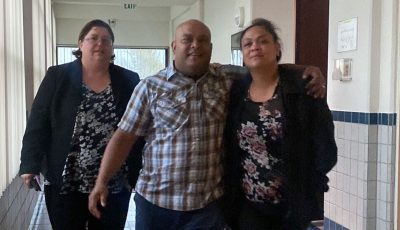Kilili: Chances slim he will be allowed to vote on Committee of the Whole
Delegates of Guam, A. Samoa, US Virgin Islands as well as resident commissioner of Puerto Rico in same boat
There is a zero to miniscule chance that delegates from U.S. territories as well as the resident commissioner of Puerto Rico will be allowed to vote in the Committee of the Whole of the U.S. House of Representatives when the 114th Congress convenes next month, according to Delegate Gregorio Kilili C. Sablan (Ind-MP).
“I think there is a very small chance that the rules will be changed to allow the delegates and the resident commissioner from Puerto Rico to vote in the Committee of the Whole, when the 114th Congress convenes in January. Typically, this vote has only been allowed when the Democratic Party was in the majority in the House of Representatives; and the rule has been revoked when Republicans are in the majority, which will continue to be the case in the next Congress,” said Sablan in an email to the Saipan Tribune.
This comes on the heels of Rep. Steny H. Hoyer (D-MD) penning a Dec. 19, 2014, letter to Rep. Pete Sessions (R-TX), House Committee on Rules chairman, to urge the rest of the House Republican leadership to recommend extending voting privileges to nonvoting delegates from the CNMI, Guam, American Samoa, the U.S. Virgin Islands, and the resident commissioner of Puerto Rico in the Committee of the Whole House on the State of the Union when the House considers its rules package for the 114tn Congress.
Hoyer, the Democratic Whip, argued that since House delegates and the resident commissioner have had the right to vote in House committees since 1971, there is no reason they shouldn’t also have the right to cast votes in the Committee of the Whole.
“House delegates and the resident commissioner are elected by the American citizens they represent, just as all House members are, and collectively represent almost 5 million Americans,” he said. “Furnishing delegates and the resident commissioner the opportunity to express, for the record, their positions on issues of significance that are before the Committee of the Whole strengthens the ability of the electorates in the District of Columbia and the U.S. territories and possessions to hold their representatives to account at election time.”
According to a report from the www.examiner.com, the practice of allowing territorial delegates and the resident commissioner of Puerto Rico to vote in Committee of the Whole sessions began Jan. 4, 1993, following a shift in party control of the House. The Republicans were unhappy with giving delegates any kind of vote, even a limited vote was too much to accept so they filed suit.
Minority Leader Robert Michel (R-IL) filed suit in the U.S. District Court of the District of Columbia to try and stop the delegates getting a committee vote. The Republicans lost the case Michel vs. Anderson and appealed to the District of Columbia U.S. Court of Appeals.
The federal appellate court upheld the lower ruling and the matter has remained a partisan dispute leading to new rules for the 112th Congress stripping the territories of the limited committee vote. It carried on to the 113th Congress and it seems in the 114th Congress as well.



























